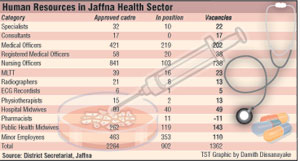
Jaffna’s health services on verge of collapseLarge numbers of patients in the peninsula are being deprived of medication as the district’s health sector is in the throes of a crisis due to a lack of human resources and essential medicines. According to statistics released by the Government Agent’s office in Jaffna, 1,362 vacancies have not been filled due to a shortage of personnel ranging from nursing staff, to medical officers, to public health midwives and labourers. While there is a need for 841 nursing staff, only 103 nurses have been posted to the district leaving 738 positions vacant. From an approved cadre of 421 medical officers only 219 individuals have been posted. The basic requirement in consultants is 17, however not a single consultant has been posted to the Jaffna district. Minister of Health, Nimal Siripala de Silva told The Sunday Times the government is left helpless in regard to filling up the vacancies. He said government could do nothing to prevent the outflow of doctors and other medical staff who serve in the area for short periods and then migrate.
“As Minister there is not much I could do. I can’t lift the doctors and put them there. It is not practical. We are helpless here but we are doing our best to bring the situation under control,” he said. The Minister claimed there could be no lack of doctors, as the Health Ministry had posted the maximum number of officers to the district. Meanwhile the Government Medical Officers Association (GMOA) stated most medical officers were reluctant to work in the district as facilities provided were inadequate.“Transport is a major problem for most of the medical officers travelling by air from southern parts of the country. Most medical officers are interns or post-interns and this week the Ministry secretary promised to provide them with tickets to and from the peninsula (Palali to Colombo) once in three months”. An official of the GMOA said the organisation was monitoring the situation and hoped the agreement would be kept. Dr. Gnanajothy, Director of the Jaffna Teaching Hospital said in addition to the shortage of staff, a scarcity in essential drugs prevailed at hospitals in the north. He stressed the hospital urgently needed nurses and the same crisis was prevalent there in many other hospitals in the district. “It’s possible to carry on hospital activities with a few doctors, but without nurses and minor staff it is difficult to function as they play a major role” he said. Dr. Gnanajothy added that there was a shortage in supplies of essential drugs, especially drugs which need cold-room facilities. “We have had drug shortages from time to time” he said “and rely totally on sea transport. If the ships are delayed we have a crisis regarding the supply of medicine”. Dr. Gnanajothy added that since the ICRC stopped flying in drugs which needed cold- room facilities over two months ago, the peninsula was experiencing a shortage in these drugs. An officer of the Medical Supplies Division of the Health Ministry said the department had been informed that drugs for the first quarter were over and were hoping to ship medicines to Jaffna in the near future. |
|
||||||
|| Front
Page | News | Editorial | Columns | Sports | Plus | Financial
Times | International | Mirror | TV
Times | Funday
Times || |
| |
Reproduction of articles permitted when used without any alterations to contents and a link to the source page.
|
© Copyright
2008 | Wijeya
Newspapers Ltd.Colombo. Sri Lanka. All Rights Reserved. |
